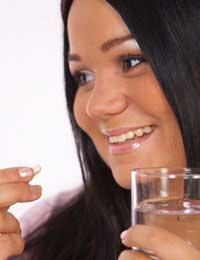Drug Therapies

Medications used to stimulate fertility have helped many women who had difficulties conceiving. These medications work primarily by altering the reproductive hormonal imbalance. Some medications can be taken in the form of a pill whilst others require an injection. The type of medication right for each individual will depend on the cause of the infertility.
The spectrum of fertility medications generally fall into two classes; follicle stimulating agents and ovulation inducing agents. Whether the medication is taken by mouth or via an injection, the main function of most fertility medications is to promote ovulation. Ovulation is the process by which an egg is released into the fallopian tubes, and has the potential of becoming fertilised by sperm.
Follicle Stimulating Agents
Clomiphene citrate trade name (chlomid, serophene) is usually the initial medication prescribed in cases of infertility. This medication is an oestrogen receptor analogue which binds to oestrogen receptors within the brain. In normal conditions elevated levels of oestrogen causes “a negative feedback loop” which leads to a decline in FSH. FSH (follicle stimulating hormone) is the principle hormone which stimulates the recruitment of mature follicles.Clomiphene works by circumventing the negative feed back loop and “tricking” the central endocrine glands, the pituitary gland, to producing more FSH. The increased FSH results in overestimation of ovarian follicles, and a greater chance for ovulation. This mechanism however is not without flaws and can result in multiple follicular recruitment and thus increase the risk of multiple pregnancies. Other notable side effects include, hot flushes, visual disturbances and in rare cases ovarian hyper-stimulation syndrome.
If after repeated treatments using Clomiphene citrate has failed to result in conception, other injectable agents may be tried. These injectable agents contain the FSH hormone which is usually derived from human urine of postmenopausal women as the active ingredient. As such, this class of medications are called Human Menopausal Gonadotropins.
Among the agents in this injectable class are pregonal, humegon, repronex and menopur. Gonal –F and follistim are similar FSH containing agents, but they are genetically engineered and are not a by-product of human specimen. Common side effects include hot flushes, headaches, nausea and vomiting.
Ovulation Induction Agents
Human Chorionic Gonadotropin, is usually secreted by the placenta as a result of pregnancy, however, this agent can also help fertility as well. In most females HCG is administered in conjunction with follicle stimulating agents. B-HCG agents exert its effect on the process of ovulation. Once the follicles have been stimulated, B-HCG helps release the eggs into the fallopian tubes. These drugs are usually given one day after the last dose of the gonadotropins, to optimise ovulation after follicle stimulation.Other Agents
The reproductive endocrine system is highly complex, involving multiple organs including the brain. Disrupting this natural process for the purpose of fertility can lead to unwanted effects. Thus it may be beneficial to block the natural process of hormone release. Gonadotropin releasing agents such as Leupron, Genirelix, Cetrorelix, inhibit the natural release of Luteinising Hormone (LH) and Follicle stimulating hormone (FSH), which can impede the effects of fertility drugs.- What is Clomid?
- Crisis in UK Fertility Treatment
- Preventing IVF Mix Ups
- Ovary Transplants: Are They Possible?
- Tips on Improving Sperm Count
- Intrauterine Insemination
- IVF Clinic Costs
- Donor Insemination
- IVF Secrets Fertility Guide
- What Support is Available for Fertility Patients?
- Pre-Implantation Genetic Diagnosis
- Pre-Implantation Genetic Screening for Aneuploidy (PGS)
- Understanding Fertility Test Results
- Intra-Cytoplasmic Sperm Insemination (ICSI)
- How Long Will Treatment Take?
- Gamete Intra-Fallopian Transfer with Donor Sperm
- Aiding Conception During Treatment
- Gamete Intra-Fallopian Transfer with Donor Eggs
- Embryo Freezing
- In Vitro Fertilisation (IVF)


Re: What Causes Sperm Loss?
antiquities. These are the Egyptian papyri
Re: What Causes Sperm Loss?
from lat. manus - "hand" and scribo - "I write") ]
Re: Ovary Transplants: Are They Possible?
Hi! I 37 years old single mather. I was ovary gonadoblastoma in 2013. Removed both ovaryes . I take hormon pills but…
Re: Ovary Transplants: Are They Possible?
I am a 54 year old women who went through an early menopause. Since then I have developed all sorts of issues which I…
Re: Ovary Transplants: Are They Possible?
I have pcos with it cure it if I have this done
Re: Ovary Transplants: Are They Possible?
We are from India and my wife got pregnant through IVF treatment, now she is in her 17th week of pregnancy. We have…
Re: Ovary Transplants: Are They Possible?
Janaka - Your Question:Hi everyone,My wife 28 years old, her both ovaries removed due to cyst after that she is facing…
Re: Ovary Transplants: Are They Possible?
Hi everyone, My wife 28 years old, her both ovaries removed due to cyst after that she is facing lot's lot's of…
Re: What Causes Sperm Loss?
I'm seeing only watered with little amount of white colour when it come out from my anus .wt is ur suggestions for this . please send reply.
Re: Ovary Transplants: Are They Possible?
I'm 38 years old , and I'm on HRT tablets because I have high hormones levels (FSH, LH) post menopausal, can I do…